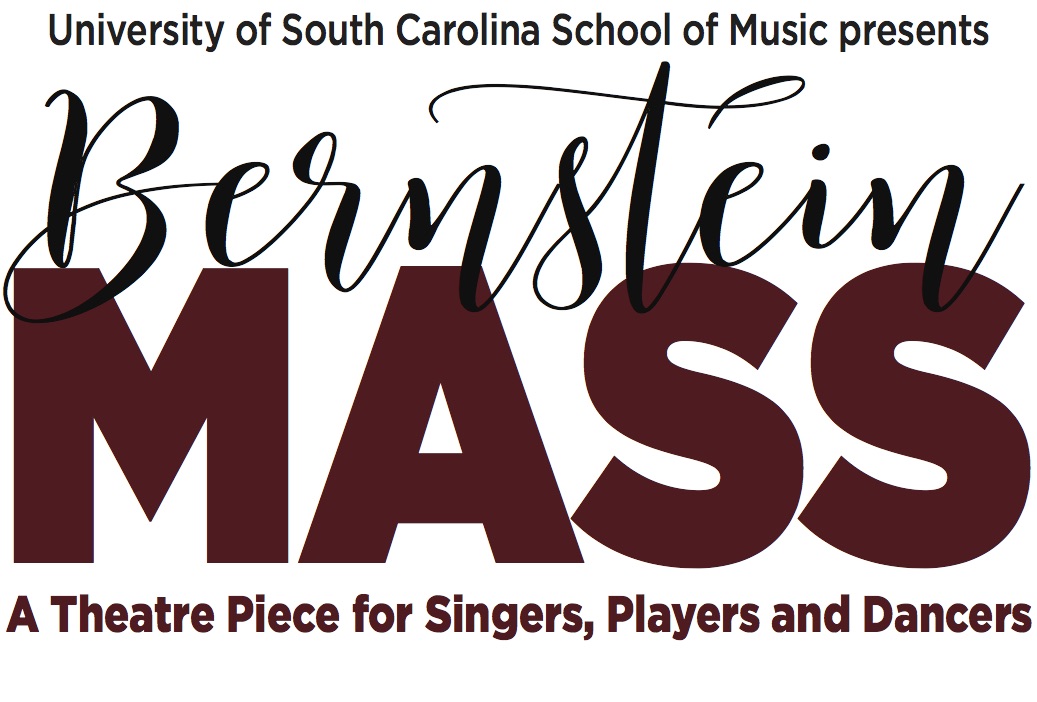University of South Carolina School of Music mounts its largest musical event in 2018

Leonard Bernstein’s MASS brings profound messages of peace and unity
The University of South Carolina School of Music marks the centenary of American composer and conductor Leonard Bernstein’s birth in 2018 with his monumental MASS, a theatre piece for singers, players and dancers. The production was composed at the request of Jacqueline Kennedy Onassis for the opening of the John F. Kennedy Center in 1971. Bernstein’s MASS is one of the most profound stage works ever created in English and an iconic piece of Americana. The epic stage production includes two orchestras, a rock band, a blues band, several choirs, singers, dancers and actors, and features as the Celebrant acclaimed Seattle tenor Kevin Vortmann, who recently performed the role to critical praise with the Philadelphia Orchestra.
MASS, sung in English, Latin and Hebrew, was Bernstein’s most ambitious theater work. Themes of faith, doubt and tolerance, and the work’s powerful message of hope, renewal and unity through peace and understanding, is explored through journeys both spiritual and secular. After the premiere’s final note in 1971, the audience sat in silence for three minutes, then stood and applauded for thirty.
The USC School of Music mounts this spectacular work for three performances on March 2, 3 and 4, 2018, at the Koger Center for the Arts. Tickets go on sale this summer and will be included in the 2017-2018 season subscriptions of Opera at USC and the USC Symphony Orchestra. Single tickets and group tickets will also be available.
The son of Russian-Jewish parents, a social liberal, and lifelong activist, Bernstein made a surprising choice of text when approached by Mrs. Kennedy to write the work: the Roman Catholic Mass. But instead of a straightforward, purely musical setting of the Latin liturgy, he created a broadly eclectic theatrical event by placing the ancient religious rite into a tense, dramatic dialog with music and lyrics of the 20th-century vernacular to explore the crisis in faith and the cultural breakdown of the post-Kennedy era.
While employing some of the elements of a traditional Catholic Mass, the piece also draws upon the composer’s Broadway experience as well as other religious and popular genres. “I’ve always had a deep interest in Catholicism in all its aspects; its similarities and dissimilarities to Judaism,” wrote Bernstein. He used the mass as the structure to express his beliefs and questions about society and our world and is considered the composer’s life statement.
Bernstein enlisted the 23-year-old composer-lyricist Stephen Schwartz to work with him on the text. Schwartz had recently proven his ability to transform religious stories into contemporary theater with Godspell, his hit musical based on the Gospel of St. Matthew. Once again, Bernstein reached beyond his own world of classical music for a collaborator to help him create a large-scale musical theater piece, as he had with West Side Story.
Bernstein and Schwartz mixed sacred and secular texts using the traditional Latin liturgical sequence as the fundamental structure and inserted recurring themes in vernacular English that question and challenge, and meditations that demand time for reflection. They took the Tridentine Mass, a highly-ritualized Catholic rite meant to be recited verbatim, and applied to it a very Jewish practice of debating and arguing with God. The result was a piece that powerfully communicated the confusion and cultural malaise of the early 1970s, questioning authority and advocating for peace.
The eclecticism of MASS’s music reflects the multifaceted nature of Bernstein’s career, with blues, rock, gospel, folk, Broadway and jazz idioms appearing side by side with 12-tone serialism, symphonic marches, solemn hymns, Middle Eastern dances, orchestral meditations, and lush chorales, all united in a single dramatic event with recurring musical motifs.
During his work on MASS, Bernstein consulted with Father Dan Berrigan, a Catholic priest and anti-war activist who had been on the FBI’s “10 Most-Wanted” list before being apprehended and imprisoned. In the summer of 1971, as MASS approached its premiere, the FBI warned the White House that the piece’s Latin text might contain coded anti-war messages and that Bernstein was mounting a plot “to embarrass the United States government.” President Nixon was strongly advised not to attend and was conspicuously absent at the premiere.
Responses to the premiere of MASS covered the spectrum. The Roman Catholic Church did not approve—some cities cancelled performances under pressure from their local Catholic churches—while other prominent clergy declared their support for the piece. Certain music critics disapproved of the mixing of genres, while others found the work to be inspired. For the most part, the audiences were deeply moved, experiencing firsthand the shared, communal journey of the composition.
Over the years, the ideas and dissent embodied in MASS that were so threatening to the political and religious establishments in the volatile early-1970s, have become a more accepted part of spiritual and political discourse. MASS came full circle when, in 2000, Pope John Paul II requested a performance at the Vatican. Its radical mixing of musical styles, too, has also become less shocking and more accepted in the musical sphere. Time has revealed MASS to be a visionary piece that continues to be relevant and move audiences as it enjoys performances around the world.
Key University of South Carolina faculty members are Ellen Douglas Schlaefer, stage director; Scott Weiss, conductor; Alicia Walker is chorus director/master; and Neil Casey, assistant conductor.
By arrangement with Boosey & Hawkes, Inc., Sole Agent for Leonard Bernstein Music Publishing Company LLC, publisher and copyright owner.

